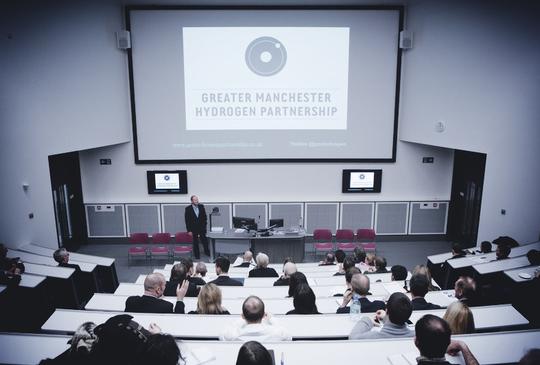
Fuelling the future: new hydrogen partnership launches
Launched earlier this year, the Greater Manchester Hydrogen Partnership (GMHP) is working to make hydrogen fuel cell technology more commercially available. The partnership brings together Manchester Metropolitan University (MMU), with the Association of Greater Manchester Authorities and the Greater Manchester Energy Group, and is promoting the technology across three key areas – powering buildings, powering vehicles and refuelling infrastructure.
The market for hydrogen fuel cells is set to grow by 39% over the next year alone, explains Amer Gaffar, the partnership’s project manager. And with most of the leading car manufacturers already developing hydrogen powered vehicles, it’s estimated that by 2030, there will be 1.6 million on UK roads.
“Hydrogen fuel cell vehicles are a reality - they are essentially electric vehicles with a fuel cell powering them. But what they get rid of is the ‘range anxiety’ that people have when they’re driving around in battery-powered cars,” he explains.

“Fill-up time is about five minutes as opposed to six hours and you’ll going to get a similar distances as you would from a traditional car.”
GMPH is also looking at the whole transport infrastructure across greater Manchester and investigating ways of powering CHP systems with hydrogen. It’s currently undertaking feasibility studies at MMU’s energy-intensive John Dalton building, as well as the headquarters of Transport for Greater Manchester.
“It’s a modular technology,” continues Gaffar, “and as it becomes more commercial we can add to it and create our own heat networks – they’re a lot more efficient, and a lot cleaner but you have to get to the non-fossil hydrogen to make it completely clean.”
Non-fossil hydrogen has become the Holy Grail for the technology. Currently, hydrogen is largely produced from fossil fuels, like natural gas, but it can also be created from renewable sources, which will make it a truly carbon-neutral source of energy.
“Hydrogen is an abundant resource – how you get to it is the tricky part,” says Gaffar.
To tackle the problem, and find new, cheaper ways of creating non-fossil hydrogen, GMHP has now brought together research teams from the city’s three leading universities.
“There are figures being quoted that non-fossil hydrogen isn’t going to become a true reality until 2020. Our hope is that we can take five years off that timeline.”
Contributor Profile
Mark Hillsdon is a freelance writer with a passion for nature and the great outdoors. A regular contributor to magazines such as Coast and CountryFile, he also writes on sustainability for the Guardian, and the occasional travel piece for the Independent. On Sunday. He has also been writing on all things Mancunian since first getting off the Euston train as a student nearly 30 years ago.

